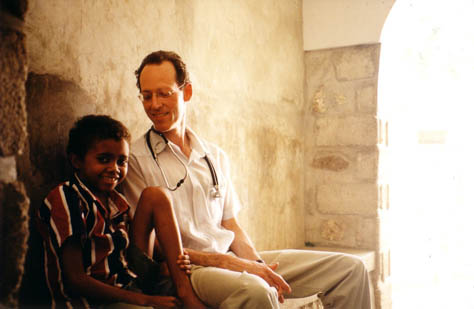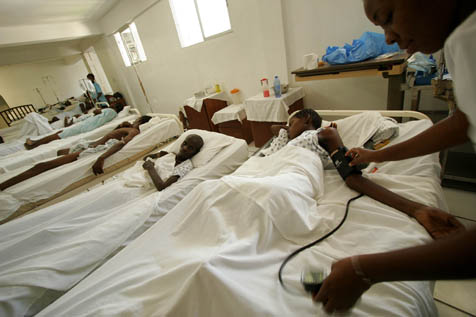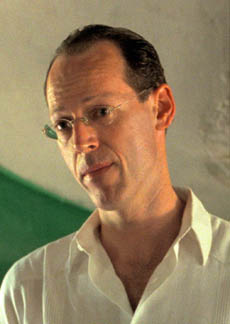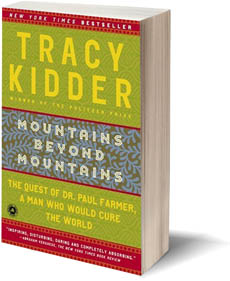Paul Farmer and Thomas Tighe Discuss the Practical Ways to Cure the World
The Good Doctor

Every cause has its champions: those who see possibility where others see insurmountable challenges, whose vision inspires thousands, and whose work changes the way we understand our world. In the social justice and global health movement, Dr. Paul Farmer is one of those heroes.
Twenty years ago, the Harvard-educated medical anthropologist and physician founded Partners In Health, a nonprofit international health organization that has become a worldwide leader in raising the standards of healthcare for patients in need from Africa to South America. Today, Farmer continues to work as an educator, writer, clinic director, and physician, training a new generation of healthcare providers to consider infectious disease from a political as well as a medical perspective.
Farmer’s immense contribution to the field of global health is examined in this year’s Santa Barbara Reads! selection, Tracy Kidder’s award-winning Mountains Beyond Mountains: The Quest of Dr. Paul Farmer, A Man Who Would Cure the World. On October 22, Farmer will appear at the Arlington Theatre to discuss the book and share some of his views on the interplay between social systems and disease.
In advance of Farmer’s Santa Barbara appearance, The Independent invited Thomas Tighe to speak with Farmer about his work. As president and CEO of the Santa Barbar a-based humanitarian aid organization Direct Relief International and former chief operating officer of the Peace Corps, Tighe is another global health champion. He brings his own considerable experience and penetrating insights to the discourse surrounding international health issues and their solutions. What follows is their conversation.

Everyone in Santa Barbara is reading Mountains Beyond Mountains. Did the book get it right? Well, I don’t think there are any inaccuracies in the book. What Tracy Kidder does, and I’ve discussed this with him, is tell a story through stories. As you know from your own work, to get colossal amounts of work done, you need a colossal team. I have worked with a colossal team, and not only the colossal characters mentioned in the book.
That’s why my own writing is a bit different, and the way I tell a story perhaps focuses more on patient-colleagues and other colleagues. There are really hundreds of community health workers who are doing yeoman’s work, hard work.
That emphasis comes through in your own book, Pathologies of Power. Right, so you can see the difference. Tracy Kidder was writing his book at the same time I was writing Pathologies of Power. So a lot of the issues he wrote about are covered somewhat differently in my writing. But his is a bestseller; mine is not.
Your book addresses, among many other things, the degree of inequality that exists in the world, and how to make progress on that front. At a broad level, do we need a new social contract to advance social justice, and do public institutions need to evolve? We need to have a new social contract. Part of this evolution is related to the basics of what technologies are available to take on epidemic disease, hunger, and those sorts of humanitarian crises. Some of it also has to do with information technologies that bring people closer, at least in the sense of having us believe that we’re closer. If you were to compare what’s going on in Darfur with the Rwandan genocide, it might be interesting to look at how information technologies have made a difference or not.
Another point, and I’d be curious to know what you think, too, is the consensus of the ’70s and ’80s around structural adjustment and the burdens placed on really poor countries. I don’t think those strategies worked to reduce poverty. They increased inequalities.

What we’re trying to say is that a new social contract is needed if we’re going to take on epidemic disease, and even structural violence and personal security issues. Some things really need to be reconsidered because they are not commodities. Services are required that we’re not going to be able to sell. We need to consider them as either being provided or not. And I think that’s the way the social justice point-of-view can surge forth.
You know, I work so much in Haiti, and Haitians are very clear on these points. They talk about history. They talk about wrongs done to them. They’ve been great teachers for me.
It seems to me that there’s a basic dilemma about how best to move forward, and what institutions people trust to tackle the problems. Your work has been central in raising attention to public health issues, and your success with Partners In Health in working on very tough issues in very poor places like Haiti has inspired confidence in others, and a keen desire to help. But at the same time, there’s an erosion of trust in governmental institutions-even in the public health institutions that historically have done a good job. So if people want to help, but they only trust non-governmental organizations, are those non-governmental organizations [NGOs] capable of going to scale? They’re not. They’re not big enough. They’re definitely not big enough. And instead of just disparaging government and its many failures, we have to think about how we can rebuild confidence in government. You know, I don’t work in government, and I’m not going to be an elected official. That’s not going to be my primary way of engaging these problems.
NGOs cannot go to scale. Only governments can go to scale. Also, it is only governments that can provide their citizenry rights in a meaningful way. NGOs, church groups; we can’t give a Haitian court the authority to help secure the right to clean water, or any right, that I can see.
And so finding a way to work effectively with governments is sort of the Holy Grail of public health and public education. And it’s a tough, tough lesson for NGOs to understand that we can’t do it without public education and public health. There’s just no way.
But isn’t it also tough for the governments themselves to attract and keep the talent necessary for this type of collaboration to work? It is true. You go out to places like we did in Rwanda, out in the countryside, and there’s no talent in the hospitals because the hospitals are empty. But once you can put in place the basics, you can recruit talented young people-doctors, nurses, and community health workers.
And that’s what we’ve tried to do: open up a space so that in Lesotho, Malawi, Haiti, Rwanda-everywhere we work-our colleagues who are from there can do good work. And that’s the other exciting thing about this work, to me, is that if we can just provide the tools of the trade-whatever our trade is called: diagnostics, therapeutics, preventives-a lot more people will want to work in a functioning system than in a nonfunctioning system.
In Rwanda, there might not be a large number of people with the training and experience, but the ones who have accepted this as part of their obligation are impressive, in my view, and they deserve our solidarity. They also demand it. They say, “Well, you’re not going to ever bring any of this to scale without working with us.” And they’re right.
Rwanda has been for me a place where you see all the devastation and problems that you see in Haiti, and it also has a very complicated and difficult history, as you know. But it’s now a well-managed, more transparent place. I know that is disputed, but my experience has been very good in Rwanda. We’ll soldier on in the public sector and everywhere we work, but it’s really nice to work in a place where you feel that the elected officials are trying to do their jobs.
In addition to just now articulating the rationale for Direct Relief’s mission better than I ever have, you have generally taken some broadly accepted global health issues and flipped the conventional wisdom on its head. For example, with HIV five years ago, you explained that “treatment is prevention,” and you showed how to do it. You showed that multidrug-resistant TB treatment is possible in resource-poor areas, and you showed how to do it. What other accepted norms are lurking out there that need to be flipped? Well, let me give you one example of where we tried to flip the thinking on its head, and I hope we will succeed. It’s the notion that it’s not sustainable to pay community health workers. What we’ve said is, “It’s not sustainable not to pay community health workers.”
We have marshaled what evidence we can, and we’ve looked for allies who understand that you can’t go into a dirt community and say to a 35-year-old woman who has six kids, “We want you to work as a volunteer community health worker,” meanwhile paying consultants and people like me. So we said, “This is ridiculous. We all know that’s never going to be sustained. Whatever they can do as volunteers will not be enough.”
And I think we’re making headway. We’ve already committed ourselves, as you could probably tell from my writing, to respecting the labor of the poor and paying them for their labor. But I think we’re also making headway with people who have been critics or skeptics. We’re saying, “Hey, we can make this work, but it has to be realistic in the context we’re in.”
How hard is it injecting that realism into what is often a political and ideological discussion in which people can comfortably retreat to their respective camps of “I’m for market approaches and against socialized medicine” versus “Markets fail, there’s no fallback plan, poor people lose, and that’s why government should do this”? Well, you know, I don’t think we’ve shied away from the ideological discussions, but one thing we’ve tried to do is say, “Okay, we may disagree on various fundamentals, but do you really think that the destitute sick should have no access to care?” And if the answer is, “No, I don’t really think that.” Then we say, “Alright, what’s your strategy for bringing them services? Do you really think that destitute children shouldn’t have primary school? Do you really think people should have to drink dirty water in the 21st century?” And, you know, when you get down to this order of questions, these basic principles, a lot of people will say, “Okay, well, no, I agree, so let’s work out some strategy,” and that strategy always looks the same.
It’s saying that if you’re going to work with the really poor, you have to believe that some things shouldn’t be just commodities. We’ve tried to depoliticize that as much as we can. Sometimes we talk about social justice; sometimes we talk about history, as a way of speaking about what’s happening in a certain place. We’re willing to be very supple with our justifications for good work.

Here’s another dilemma that you’ve had more success with than most anyone. A single disease that affects group of people, say, HIV or MDRTB (multidrug-resistant tuberculosis), can galvanize a big campaign and a big funding pool. But you are pulling back the zoom lens and looking at people’s broader situation in terms of poverty and, really, seeing them as people and not just hosts for a particular bacteria or virus. Do you lose support as the issues become more broadly focused? I think you lose people, but you gain a lot of people, too. You lose the experts and you gain all sorts of popular support.
“Vertical programs” is what the public-health policy wonks call these single-disease focused issues. So, if we say, “We don’t do AIDS programs. We do integrated primary healthcare. We’ll take the AIDS money, but we’re going to use it to strengthen health systems and to take on any kind of problem,” the response is, “Well, you can’t do that. That’s not sustainable. That’s not why we created these funding mechanisms.”
And then we say, “Well, look on the ground. You have a vertical program in a rural area where there’s no healthcare. You know, in a place where there are 500,000 people-no district hospital.” What do we do with maternal mortality? What do we do with obstructed labor? Do we say, “Oh, go down the street to the Caesarian-section vertical single program?” And, of course, there is none.
So we say, “We have to do all of this to have a decent AIDS program, and you can call it what you want, but we need to link this to broader goals.” We pull back the zoom lens, as you said, and then we sneak in primary education, poverty reduction, access to micro-credit, improved agricultural programs, and, like I said, we do lose some of the experts who make all the rules, but we gain huge amounts of support, from the local population, of course, and also, I think, from discerning people in the public sector in Africa.
You mentioned once, at a conference I attended, the absurdity of social marketing of mosquito nets because it was premised on trying to generate revenue from something that was killing desperately poor people and, by the way, that we were wrong to tell poor countries they couldn’t use DDT even though it worked well. These comments were totally against the grain-the lady next to me gasped-but when I talked to her later, she said she agreed with you, but hadn’t ever heard someone say those things. What’s the source of these insights-is it the doctor in you? Well, I have to give a lot of credit to Haiti, again, and the way that I’ve learned. I heard Haitians in rural Haiti speaking about these “sacred cows of development,” and this was before social marketing came along. I’m not against social marketing per se on an ideological basis, but when I heard it, I thought, “No. C’mon.”
So, I’ve been trained by the Haitians. And it’s good to be a doctor, because then you always have to say, “Let’s see what we can do to help this patient.” Today, for example, I am struggling, along with many other people, on behalf of a woman in Haiti with leukemia. She’s a young woman, and you won’t find any public international health specialist saying, “Well, here’s how we treat leukemia in an area where the per capita income is $300.”
So many people have already given up on these complex interventions. But her family’s not going to give up, and her children aren’t going to give up. And so somebody who is an ally of someone with a problem like that, say, a doctor or a nurse, is going to have to question these sacred cows, these principles, and say, “Well, there’s got to be something we can do that’s effective.” MDRTB is even worse. We learn a lot from our patients and their families.
Also, Haitians are very conscious of context. The Haitians’ mantra is “We lost our land. We had slavery.” And, you know, I love the people I work with. I hear these voices, as well. I think it’s been a useful lesson for me.
What comes through in what you say is a consistency between caring for individual people at the healthcare level and caring about humanity in the abstract at the policy level. That capacity, sadly, seems to get compartmentalized at times-becoming overly melodramatic in the first instance, and overly sterile in the second. Well, thank you and, since we’re colleagues in this work, I’ll tell you, sometimes students ask me about studying public health and public policy, and I say, “Absolutely. Those are great things to do, but first go work around people living in poverty or people who are displaced by war, or any kind of structural violence. Go work with them first and they’ll make you better public health specialists, better policymakers. You’ll know what poor policy looks like, and why, and how to be careful in forming policies for large populations. You’ll remember to be careful about individuals and exceptions.”
You know, I think that the problem with a lot of the expert opinion is that it just shuts out voices that don’t fit into the model. Some people do have leukemia in Africa. And a lot of women have obstructed labor, and there’s no way to save their lives except to have modern obstetrics, an operating room, and a blood bank. If that’s not deemed a priority by public health people, then it’s the public health people who are wrong, not the women in obstructed labor. So that’s Paul.
So, with all you’ve seen, are you optimistic? I’m optimistic, and I hope it’s not some sort of personal psychopathology: “optimistic in the face of difficulty.” You know, one of the reasons is that when you do focus on discreet problems-a particular family or a particular village or community-and you bring resources to bear on those problems, almost no problem is insoluble. You’re not going to, say, bring resources to bear on a village in Lesotho where there’s lots of AIDS and tuberculosis and then fail to have people get better. You will succeed.
And so that tends to breed optimism. People say, “This isn’t doable,” and you say, “Oh, yeah, it is. We did it already,” or, “We work with people who have done this,” and so those smaller victories, I think, breed optimism, and they breed optimism not just among people like you and me, but also among those being served. Yes, there are all sorts of problems after you address those medical complexities, such as unemployment, labor migration, gender inequality, bad foreign policy-it’s a long list, but it helps to have experiences that are basically successes. And it also helps, as I said at the beginning, to have a big team of people, because in the event that someone is feeling pessimistic, as one does in this line of work sometimes, there will always be someone else who still feels optimistic on that day or that week. So that’s another thing, you know, working with a good team, and I work with really good teams. I’m lucky.
4•1•1
Paul Farmer will appear at the Arlington Theatre on Monday, October 22, at 8 p.m. The lecture is free to the public, and books will be available for purchase and signing. As this year’s focus of our Public Library’s Santa Barbara Reads! program, Mountains Beyond Mountains will be the subject of a series of public lectures and discussions during the month of October. For more information, call 564-5633 or visit sbplibrary.org. To learn more about Partners In Health, log on to pih.org. For more information about Direct Relief International, visit directrelief.org.



